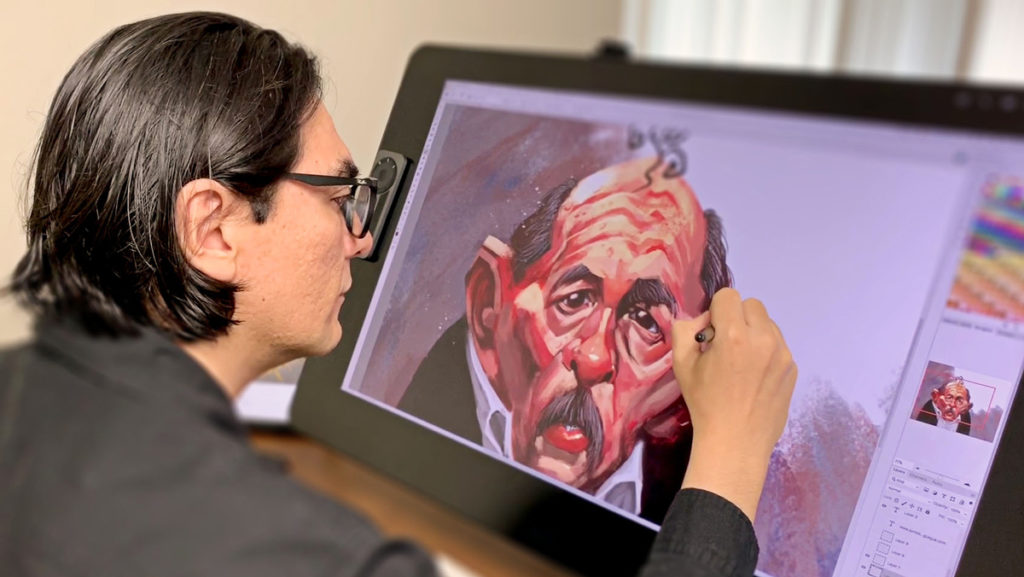After escaping from Nicaragua on Christmas Day in 2018, Pedro Molina, Ithaca College’s International Visiting Scholar in Residence, is now struggling to plan his future after the college decided to end the Scholar in Residence program.
The Ithaca City of Asylum (ICOA), an organization that offers asylum to international writers, scholars and artists, has been sponsoring writers-in-residence, many of whom have been exiled from their home, since 2001. The Office of the Provost and the Honors Program at the college have supported three of those writers, beginning in 2012.
The Honors Program is set to be restructured and moved from the Office of the Provost to the School of Humanities and Sciences. The restructuring of honors began in Fall 2019, the same year that Molina began his residence at the college. Dave Maley, director of public relations, said that Molina’s residency will be over at the end of the 2020–21 academic year.
The process of phasing out the program began before the Academic Program Prioritization (APP) began. The decision to not appoint a new scholar is not specifically associated with the APP, but is consistent with its objectives, Maley said.
The Office of the Provost told the ICOA in September that it would not be seeking a scholar in residence for the upcoming year, Barbara Adams, assistant professor in the Department of Writing and founding member of the ICOA, said.
Adams said the ICOA began helping Molina search for alternative placements and positions that would allow him to stay in the U.S. and sponsor his visa, as ICOA does not have necessary funds to sponsor Molina’s residency without support from the college. While in Ithaca, ICOA helps pay visa, legal and housing fees for Molina and his family, Adams said.
Molina is a cartoonist who draws daily comics for Confidencial, a Nicaraguan digital publication. Molina fled Nicaragua after police raided the offices of Confidencial, killing one journalist and jailing two others. He said being able to continue his work in safety has helped him greatly, as he no longer has to fear for his family’s or his own safety.
“The problem is, the situation in my country — the crisis — is still going on,” Molina said. “It’s even worse than when I left. Going back is not an option.”
This semester Molina is teaching three courses, two in the Department of Art and one in honors. Molina said he feels the main benefit his involvement in the Scholar in Residence program has on his students is the unique perspective he is able to provide.
“[The reason the program is valuable] to the Ithaca community is that they are able to learn from a different perspective, different sensitivity, about what is happening around the world and how the rest of the world sees what is happening in the U.S.,” Molina said. “You are learning firsthand from other cultures, other ways of life, other problems that could be happening in the world without you even knowing.”
Raza Rumi, former scholar in residence, director of the Park Center for Independent Media and a current board member of the ICOA, said that the Scholar in Residence program was extremely valuable to him and his family. His two-year residency spurred him on to continue teaching at the college.
“It enabled me, first of all, to become a part of a very vibrant community on campus and outside the campus and it enabled me to continue work on my writing and journalism,” Rumi said. “It also facilitated a career transition for me because when I started teaching, I started liking it very much, so I chose to adopt this as my new career.”
Alicia Swords, associate professor in the Department of Sociology and former director of the Honors Program, said the Scholar in Residence program allowed honors to offer classes from the perspective of those who are being targeted for their actions and views.
“I think the innovative contribution of this program is that it brings people who suffer personally — human rights abuses and violations of their rights — to be educators at our college,” Swords said. “I think that’s a model that really should be replicated, not undone. It’s a model for knowledge to be created by the people most directly affected. … It’s a real shame that Ithaca College isn’t resourcing this program.”
Sophomore Taspia Arpee is currently taking Molina’s honors class about political cartoons. While Arpee had no experience in cartooning or politics, Molina’s perspective and experience has made the class enjoyable and easy to understand, Arpee said.
“When we talk about Latin America in specific, he talks about how so many journalists don’t have the space to talk about things and how that kind of changes the way that their political cartoons are made,” Arpee said. “We can see the difference between the ways certain events are portrayed in different countries compared to how they are here.”
Due to the COVID-19 pandemic, Molina’s time at the college has been different from the previous scholars because he had to move to remote instruction for his classes. Molina said that this hindered his ability to create relationships with the college community.
“I was hoping that I could get a chance to remain at IC, but I have been told that because of the budget restrictions that the pandemic put onto the college that it would be very difficult,” Molina said. “The reason I left Nicaragua is because there is a dictatorship going on down there and me being a cartoonist, I was drawing about this stuff, so I had to get out to keep doing these cartoons.”








